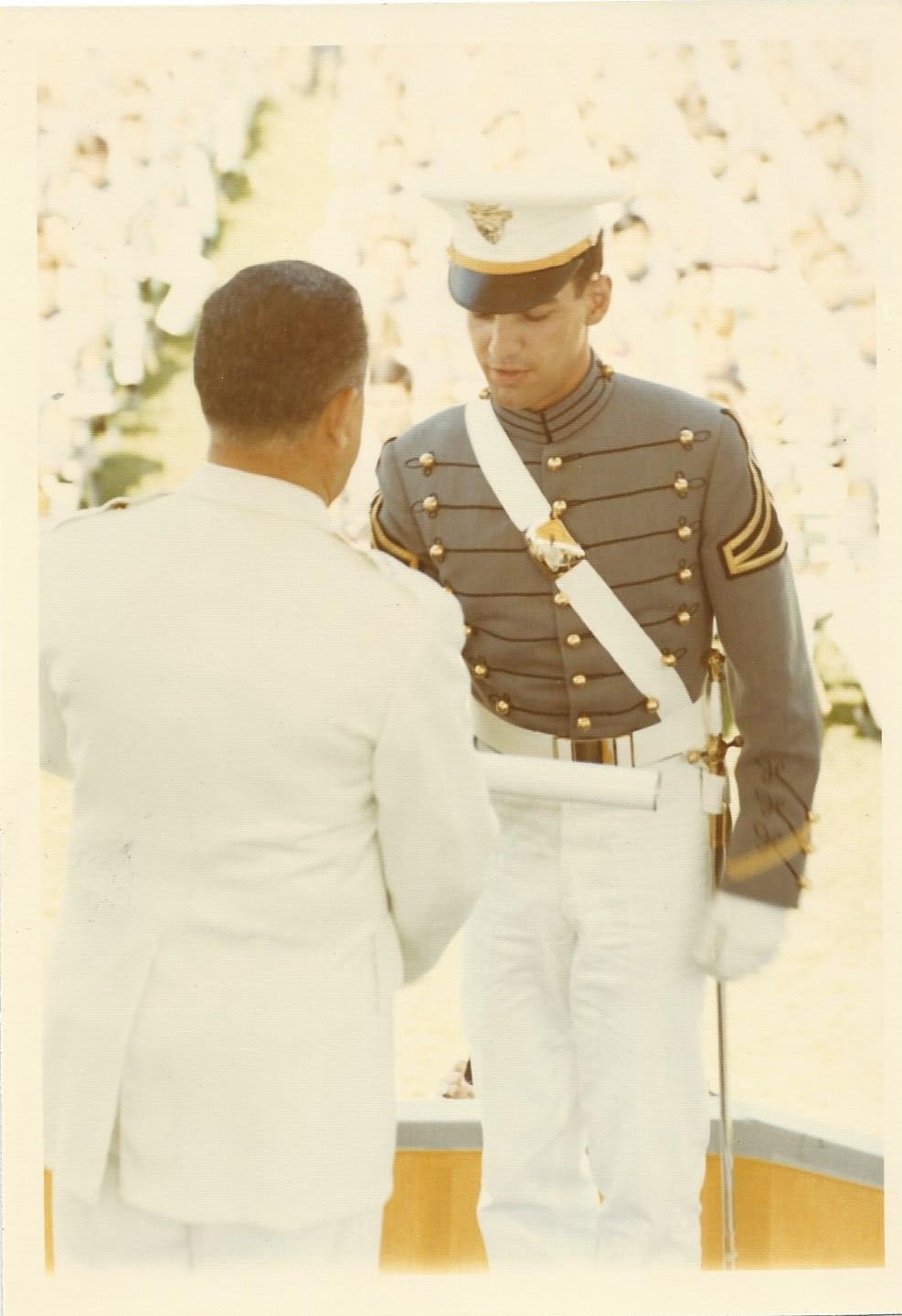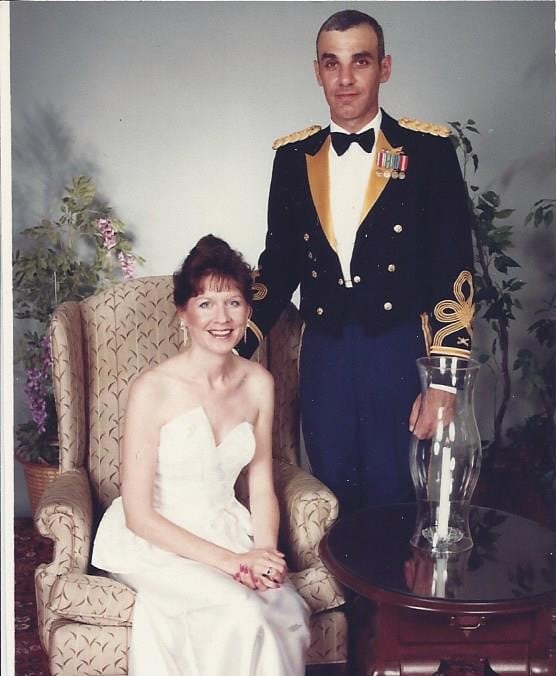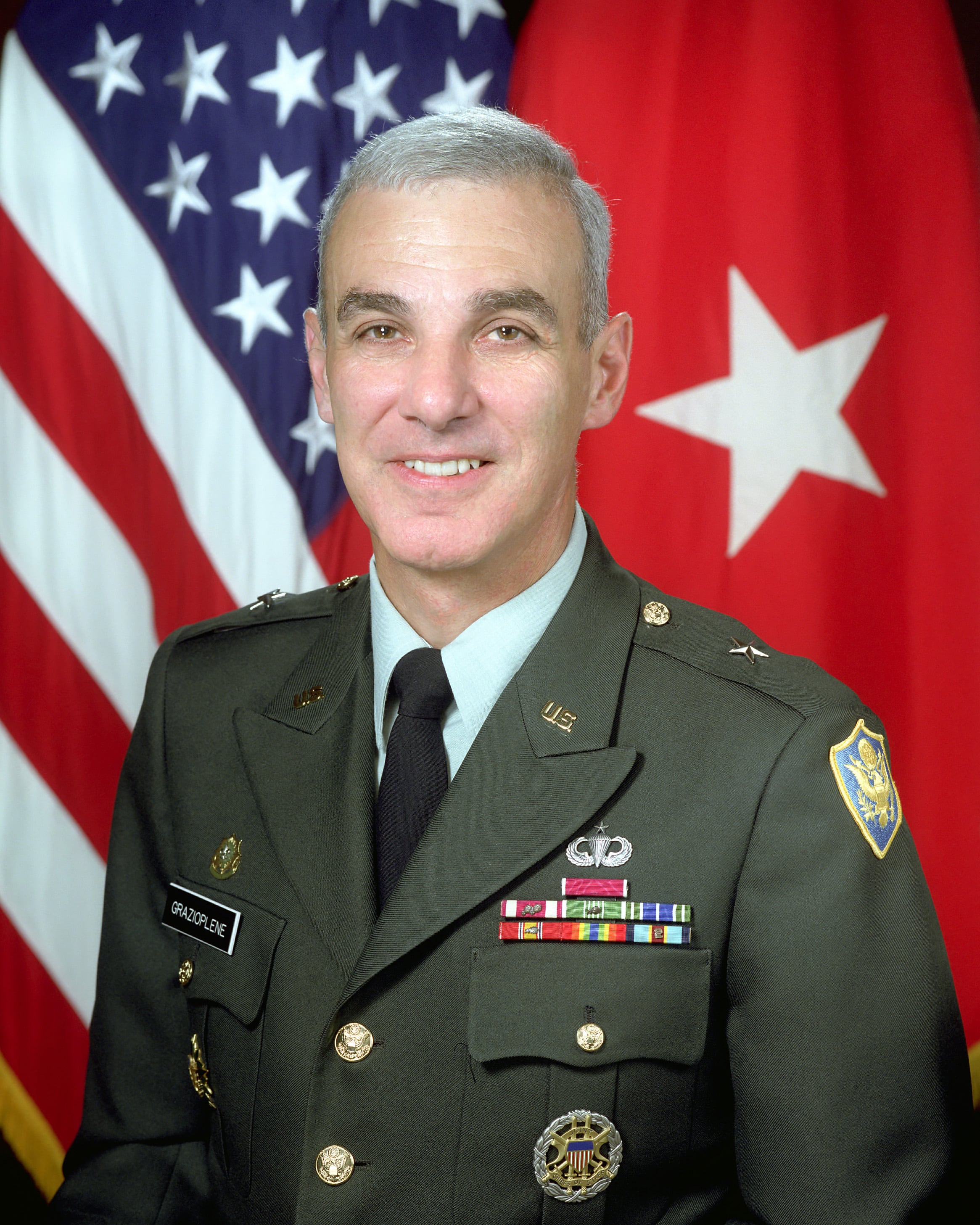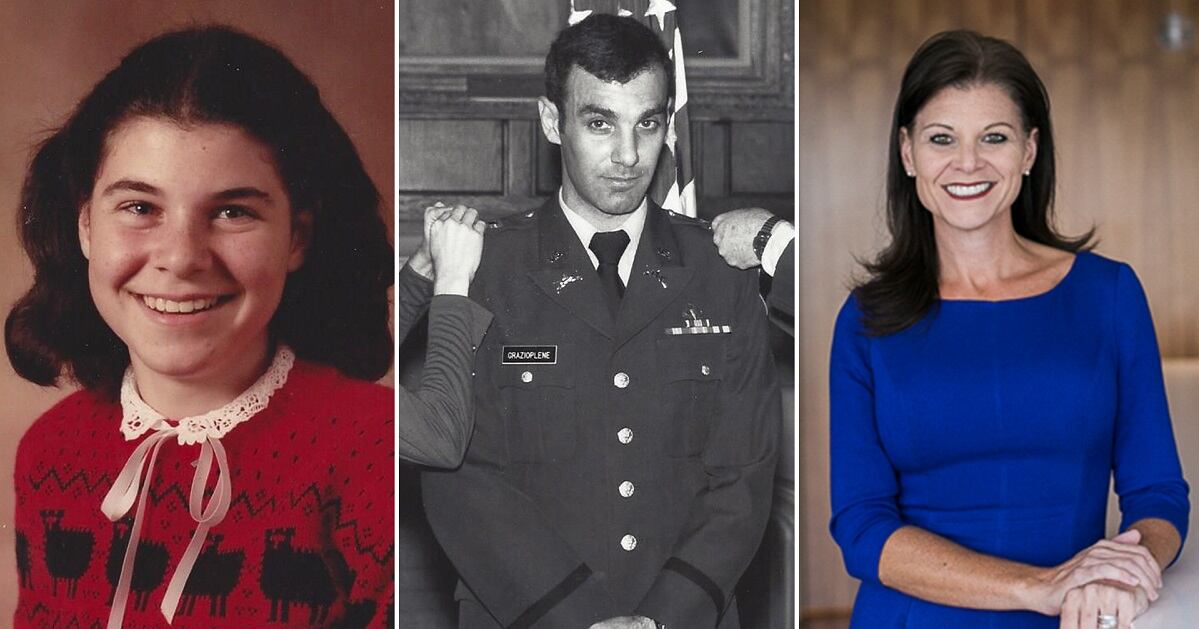She’d gotten the call. Her attorney told her she needed to be ready, the hearing was happening in just a few days.
A few days.
A shattering lifetime of pain was going to come down to a few days.
On July 6, Jennifer Elmore got into her pewter gray Mercedes convertible and began the drive from her Chapel Hill, North Carolina, home to Alexandria, Virginia.
The 48-year-old woman didn’t put on any music for the four-hour drive up Interstate 95. But the slow traffic allowed her to jot down notes on her grid-paper pad in the passenger seat.
She had one focus — to condense into a few short pages the innumerable sexual violations of an entire childhood, the agony and the betrayal, that had turned to lies, shame and deep depression in her adult life.
Pages she planned to read to her father, retired Army Maj. Gen. James Grazioplene, in a Virginia courtroom. A two-star career armor officer who served in uniform for more than three decades and retired honorably in 2005, Grazioplene was later charged by the Army with incest and multiple counts of raping his daughter over the course of her entire childhood. After years of court battles, he pleaded guilty in a Virginia courtroom to aggravated sexual battery and was sentenced on July 8.
RELATED

Army Times made numerous attempts to reach Grazioplene, now 71, through listed phone numbers, his attorney and a relative. On July 11, a woman who identified herself as his wife answered a call from a reporter and declined on his behalf to comment on the story.
A long legal road
Five years before, Jennifer had reported the decade and a half of sexual abuse to Army officials at Fort Bragg, North Carolina. At first, she made an anonymous call to learn how to report the abuse.
The officer on the other end of the call wanted her to come in, give a statement, start the process. So, suddenly, she had an appointment to go back on an Army base, talk to soldiers in uniforms. She didn’t know she could say no — a life with an Army officer father had taught her to follow orders. During her visit to Fort Bragg, the story poured out.
She recalled night after night in dark, ignored bedrooms, a laundry room and anywhere he could steal away time with a child, at stops on the way to piano lessons, beginning when she was just a few years old and continuing until she had grown into a young woman, heading off to college.
That interview would lead to six counts of rape and incest being lodged by the Army against one of its own who’d risen to the heights of rank.
Two years later she would testify against her father in a military courtroom at Fort Meade, Maryland.
Jennifer arrived at Fort Meade expecting soldiers in dress uniforms. What she got was a team of military attorneys — some new, some old hands — dressed in civilian clothing. They aimed to show her the Army was more than the evil her father had visited upon her.
That long journey wound its way to the Fort Meade courtroom on Aug. 26, 2017. In an Article 32 hearing, her father first faced formal accusations of rape and incest.
Military prosecutors alleged the rapes took place at or near Grazioplene’s duty stations, while the family lived at Fort Leavenworth, Kansas; Bindlach and Amberg, Germany; Woodbridge, Virginia; and Fort Bragg, North Carolina.
Defense attorneys claimed Jennifer had filled in memories with false claims of rape, and that inconsistent statements she’s made to authorities over the years are evidence of her being influenced by “psychobabble” and more than a decade of abuse therapy.

Grazioplene’s civilian defense attorney throughout the process, Thomas Pavlinic, of Annapolis, Maryland, did not respond to multiple requests for comment.
At first, the case moved along. But an earlier three-year statute of limitations in the Uniform Code of Military Justice prevented prosecutors from going forward with charges for any rape or assault that occurred before 1986, when the statute was removed. Jennifer was 15 at that time, so attorneys were forced to focus on the last three years that she lived with her parents.
Her first appearance in court, and charges against her father, wouldn’t come until 2017.
As the case moved toward trial, Grazioplene faced six counts of rape and six counts of incest. But then, just weeks before the trial was to begin, the military’s highest appeals court overturned its own long-standing practice and found that a five-year statute of limitations existed for sexual assaults that occurred in the military between 1986 and 2006, a year after Grazioplene’s retirement from the Army.
The Army couldn’t continue prosecuting the Grazioplene case.
The appeals court’s controversial decision resulted in the freeing of a number of service members who’d been convicted of rape and sexual assault.
The U.S. Supreme Court has recently agreed to take up the issue in its October term. In a case called United States v. Briggs, the high court is expected to rule on whether the U.S. Court of Appeals for the Armed Forces erred in concluding that the UCMJ only allows prosecution of a rape that occurred between 1986 and 2006 if it was discovered and charged within five years.
New hope
But Jennifer’s search for justice, for at least an acknowledgment of what had been done to her and how it had been hidden, seemed lost.
Then Virginia did something that surprised even her attorney advocate, Ryan Guilds. The Prince William County prosecutor’s office decided to take up the case. The Commonwealth of Virginia has no statute of limitations on rape.
The county where she had lived as a young teenager — where her father left each day to report for duty at the Pentagon, only to return to abuse her by night — would hear her cries for help, even if decades later.
She was warned: Don’t expect much. It’s an old case and sexual assaults are hard to prove. But she’d heard those same words before, and they’d thickened her skin to help blunt the hurt she might face if this all were for nothing.
In late 2018, a Prince William County grand jury indicted Grazioplene for three alleged rapes that occurred while the family lived off post in Woodbridge, Virginia, from 1987 to 1988. Guilds called her on Dec. 7 and told her that her dad had been arrested and jailed.

It took Jennifer two months before she could look at the mugshot of him in the jail, wearing not Army green but jailhouse orange.
In many cases, he likely would have been granted bail. He would have been back at home in a gated community in Gainesville, Virginia, where the retired general was living with his wife.
But not in this case.
The judge decided not to grant a bond. As the case moved forward, Grazioplene returned to court again and again as his attorneys filed motions, each time asking the court that he be let out until the trial.
The answer was always no.
A 2020 trial date loomed. Prosecutors were ready. The defense attorneys seemed ready. But the pandemic pushed it off.
And while they were waiting, a change — prosecutors offered him a plea agreement.
Would he admit his guilt? Would he say these things happened? Could that change things?
The attorneys asked Jennifer what she wanted.
She never wanted him to suffer. She never wanted him in prison. She only wanted him to admit what he had done.
And it wasn’t just her testimony that prosecutors were relying on. They had other evidence, too.
There were letters written in the 1980s, and another in 1995, to multiple family members.

In one letter, her mother, Ann Marie Grazioplene, said, “All the while I was playing housewife he was taking perverted liberties with my child.”
In other letters, Ann Marie described times her husband had attempted to molest Jennifer and she’d walked in on it. The couple is still married and she has supported him at a number of criminal hearings since charges were first lodged in 2017.
Those letters were some of the only tangible evidence of what had ricocheted inside Jennifer’s mind when she remembered her childhood and the horrific sexual abuse she survived.
There was a phone call that Jennifer made in 2015, in which she confronted her parents. She testified about that call at the Fort Meade hearing, challenging what her father did and what her mother knew. She said the parents downplayed and brushed aside the sexual abuse, saying God had forgiven the general, now it was her job to forgive him, too.
There were the instructions. How her mother told her as she fast approached puberty what to do and what not to do, what she could wear around her father, if she could even be alone with him, Jennifer testified in the Fort Meade courtroom.
Were those echoes in her mind? Did anyone else hear them?
Over and over in the Fort Meade court hearing she testified that her abuse was an open secret, not talked about but known. Those hidden things made her question her own sanity at times.
There were her memories. Of a laundry room in New York state where he molested her.
In her room on the base in Germany where she says he raped her. Quick stops in the car on the way to piano lessons.
And it happened time after time, she said.
And through it all, they were always on the move — for the next duty assignment, the next promotion. Daddy was the spit-polish Army officer, a West Point graduate who held that honor high above all else. The kind of man living his life to become a general, she said.

Integrity, honor, commitment — those values were all showcased when Army green draped his shoulders.
But a different set came into practice in his home. Lies, abuse, torment that pushed his little girl into dark corners, moved her mind to shut down her body as she transported herself somewhere else while he hurt her.
Army prosecutor Lt. Col. Carol Brewer said during her closing arguments at the 2017 hearing at Fort Meade that Grazioplene’s “depraved acts” had forced his daughter to disassociate from the event, which sometimes happens with severe childhood trauma.
“Memories so destroyed by that trauma that she’s lost sections of her childhood,” Brewer said. “All of those memories are valid.”
It didn’t stop until she left home.
Going to college in the 1980s she began to form a new identity, make new friends whose parents weren’t friends of her parents.
Jennifer told one of those friends what had happened. But she felt powerless to do anything about it then; it was all too raw.
Eventually, more than 20 years later, she reached out to Fort Bragg, setting everything in motion and bringing her to this point.
The Army meets Jennifer
That brought her to Fort Meade two years later in 2017.
One of the Army attorneys, a captain who was helping in her attempt to hold her father accountable, approached as she was steeling herself to testify.

Pointing to the “Army” patch on his uniform, the attorney said, “This is your Army, we pick you, we’re here for you.”
“I tell you, that was a life-changing moment,” she told Army Times.
As the questions came, she answered, unburdening her past. In a room of mostly strangers and scribbling reporters on an otherwise quiet Saturday morning, she relived some of the worst moments of her life.
That preliminary hearing that lasted seven hours.
After that hot August day, the case moved slowly, as cases do. Then the word came with the appellate court decision.
But Virginia called back.
Ready for the day
Here she was, five years after calling authorities at Fort Bragg.
And days away from confronting her father for a final time in court, she paced a borrowed sanctuary home in Alexandria, dumping her thoughts onto the page. A “victim’s impact statement” was her assignment. To write down the harm he’d caused. Keep on point, summarize. How does someone abbreviate so much pain?
The words, how to get the words right so that he would hear them so that her mother — whom she knew would be there, angry as ever — would listen?
Eight pages of “gibberish” later, the court date looming, she decided she would have to remain in the moment by simply answering each question on the form she had been given.
Jennifer shared her testimony with Army Times.
“I was born into a dark and violent situation,” she said. “Joy was not something that was ascribed to my birth. From the start, it was clear my father had little use for me.”
And so, it began, her writing and her memory of her life.

“His cruelty went far beyond his words in acts of violence and sexual perversion,” she wrote. “Even when he no longer had access to my bedroom, his cruelty turned into a lifetime of judgment, lies and insistence on silence in the name of maintaining family honor and God.”
The open-ended questions, standard in these types of statements, are purposefully written to be neutral, objective. But with a few simple words, they open up a flood.
“How did this impact your childhood?” the form asked.
“Each act solidified lost innocence and profound hopelessness and powerlessness,” she replied.
Jennifer then offered vignettes of her suffering.
“At 3, he led me to the dark, dirty basement of my grandmother’s house and put me on the washing machine and pleasured himself while molesting me,” she wrote.
“At 8, he bought me a piano and insisted on taking me to piano lessons, all so he could park and take whatever sick pleasures that he so desired,” she wrote. “The same horrors occurring as he regularly insisted on bathing me.”
There’s more, but you get the idea.
“The impact of my father’s actions comes not from one singular act, although that is enough to scar for a lifetime, it comes from the collective horror of his countless violent and perverted acts,” Jennifer wrote.
Though Jennifer’s abuse crossed continents, Virginia can only prosecute and punish a person for what happens within its jurisdiction.
Woodbridge, Virginia
So it was that prosecutors’ had to focus on the Grazioplene’s home in Woodbridge, three decades ago.
“By Woodbridge, I had witnessed and knew well to be seen and not heard, that I was powerless, that resistance was futile,” she wrote.
“By the time I moved to Woodbridge, there had been countless nights I laid awake, paralyzed with fear, listening for his footsteps in the hallway,” she wrote. “Waiting for his figure in the doorway and then him making his way to my bedside to force himself on me.”
“That kind of terror doesn’t go away,” she wrote.
Jennifer would share that, even today, she wakes up in the night, crying from night terrors, as her husband tries to comfort her.

Jennifer believes her father was aided in his dishonorable pursuits by the very uniform he wore.
Grazioplene’s status, power and position, “gave him the cover to do anything he wanted,” she wrote.
As she fought to bring out of the darkness all that she’d suffered since first reporting the abuse to Fort Bragg officials five years before, Jennifer recounted in her statement how Grazioplene and his attorneys tried to call her entire story into question.
In the first hearing, Grazioplene’s civilian attorney challenged her to provide “concrete” details that could be used in a criminal proceeding, rather than spotty memories and “feelings.”
“I don’t know how much more concrete it can get than walking out of a bedroom and into a bathroom and cleaning semen out of me,” Grazioplene’s daughter told the lawyer.
Those efforts to discredit, Jennifer said, put yet another stain on her father.
“He is a West Point graduate, the two-star military general,” she wrote. “But he is also a coward and a liar.”
Jennifer’s day in court, July 8, also happened to be her birthday. She might also call it her reclamation day. That was her message to her father and mother.
“I reclaim truth. You are nothing more than people that gave birth to a child and then held [her] in captivity,” she wrote.
“I want you to know that despite you both and the lasting scars you have left, I have a life of quality and joyfulness, the likes of which you have never known.”
Energy pulsing, Jennifer left the stand. Grazioplene did not make a statement. He pleaded guilty to aggravated sexual battery.
An Army spokesman told Army Times in an email that Grazioplene’s retirement rank, and thereby his benefits, would be reviewed.
“10 USC 1370 provides the Secretary of the Army the authority to determine the highest grade in which an officer has served satisfactorily for retirement purposes. The Army is aware of MG(R) Grazioplene’s civilian criminal case and will take appropriate action,” the spokesman wrote.
The judge gave him the agreed-upon sentence — time served, with 20 years suspended. The 18 months he’d spent in jail might be the only time he sees, unless he violates the conditions of his probation.
That sentence might seem shockingly light for both the acts committed and the years of anguish.
Amy Ashworth, the commonwealth’s attorney for Prince William County, responded to Army Times’ request for comment on the case.
“The most important factor was Ms. Elmore’s wish from the outset that the defendant acknowledge his guilt, that the truth come out, and that she have an opportunity to confront her father with the impact this abuse had on her,” Ashworth wrote. “We also considered a number of factors including, the age of the case, the defendant’s age, the amount of time the defendant had served since his arrest, and the procedural history of the case.”
“Part of the mission of this office is to ensure that those who are victimized by crime are treated with dignity and respect,” Ashworth wrote.
But Jennifer was satisfied with the outcome. The case was never about the number of days spent in prison. It wasn’t even about punishment, she said. After the sentencing, her body hurt, but it felt like a weight had been lifted from her chest.
“I wasn’t interested in retribution,” Jennifer told Army Times.
She wanted something more fundamental. Something for the child she was.
“It was not about asking for something, other than to have the ability to speak the truth,” she said.
With a small group of supporters, friends, family and attorneys who’d started this journey with her years ago, she left the courthouse — and her parents — behind.
“Last night I laid down and had the most peaceful, unaided sleep I’ve ever had,” she said.
Todd South has written about crime, courts, government and the military for multiple publications since 2004 and was named a 2014 Pulitzer finalist for a co-written project on witness intimidation. Todd is a Marine veteran of the Iraq War.





